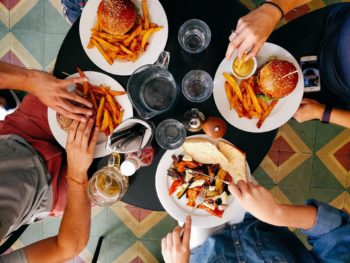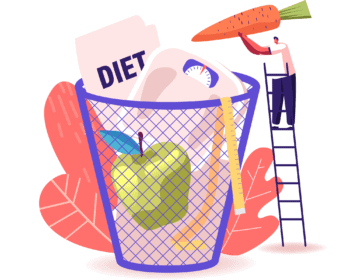posted March 15, 2022

The other day my husband asked me what this new coach certification I’ve been working towards is all about. I told him, “Intuitive eating.” When he didn’t respond, I glanced up, and could tell from his little bit of a snicker (no pun intended), he was considering making some hilarious joke. Kind of like when he asks me what magazine I’m reading and I say, “It’s a running magazine.” To him, reading about doing something as seemingly natural as running makes no sense, and likewise, learning how to eat intuitively seems, well, counterintuitive. I’m happy for him not to have had a lifetime of diet culture, food, weight, or body image issues. But in my world, eating intuitively was sucked out of me at a very young age.
If you’re not familiar with intuitive eating, you may see the words and assume it’s all about eating whenever, whatever, and however much you want. That is far too simplistic, and disregards how nuanced this approach is. At its core, intuitive eating is a non-restrictive, anti-diet approach primarily focused on reconnecting with the innate wisdom we all have about eating. It was originally developed in the 1990s by two registered dietitians, Evelyn Tribole and Elyse Resch.

Inherent in intuitive eating is the principle of non-restriction (anti-diet) and making peace with food. That is, no food is off the table. Whereas diet culture has created the idea of good food and bad food, intuitive eating seeks to quash that idea by removing stigma and judgement and creating freedom to eat all foods. But veganism requires the elimination of some foods, right? That is one of the reasons intuitive eating is thought to be incompatible with veganism.
For me, the answer lies in what I consider to be food. I don’t see an egg, a cow, a pig, cheese, or chicken as food. In the same way, I don’t see the grass in my backyard, the paper in my recycle bin, or my neighbor’s guinea pig as food. I am not restricting because I am eating everything that I consider to be food, and I am doing it without restriction or judgement of those foods as good or bad.

In intuitive eating, we strive to tune in to our body’s signals and to eat in alignment with what makes our body feel good. It takes practice to listen to our body when years of dieting may have blunted normal cues to eat and stop eating, or to enjoy or not enjoy how certain foods make our body feel. But the way I see it, listening to our body isn’t only about determining hunger, satiety, taste, pleasure, physical feelings, or energy after eating; there is also space to consider how a certain food affects us spiritually or at a level outside of our body. And for me, as an ethical vegan, the disturbance to my psyche from eating an animal feels just as bad to my soul as eating a food that doesn’t agree with me physically. When we act against our internal values regarding what we eat, it doesn’t feel good on any level. And that’s worth paying attention to, too.
There are certainly some people for whom veganism feels like restriction. If that’s so, only they can search within themselves, with honesty and curiosity, to determine the why of their veganism.
What it really comes down to, what’s key, is intention. For me, a vegan diet is one of abundance and free of constraints. It uplifts energetically and aligns wholly with my internal values.

Here are some questions to ask yourself so that you can be sure you are acting in accordance with your true desires:
- Are you choosing to forgo animal products because you think you’ll lose weight or change your body shape, composition, or appearance?
- Are you avoiding a food because you fear it, or will feel guilty eating it?
- How does eating the type of food you’re eating make you feel? Do you like that feeling?
- Would you choose to eat that way again? Would you like to feel that way consistently?
If you are a vegan considering an anti-diet, intuitive eating approach, or if you are an intuitive eater considering a vegan or plant-based eating style, don’t give up! They are not mutually exclusive.

Carol Ray is a Main Street Vegan Academy Master Vegan Lifestyle Coach and Educator, passionate about helping vegans, plant-based eaters, and the veg-curious gain freedom from unhelpful, long-held beliefs that result in (over)eating issues and alcohol (mis)use.
A National Board-Certified Health and Wellness Coach with advanced specialization in Emotional Eating Psychology, Hormone Health, and Gut Health, Carol is also a Certified “This Naked Mind” Life Coach, and a “Positive Intelligence Mental Fitness” Coach. She also completed the T. Colin Campbell Certificate in Plant Based Nutrition.
A former whale and dolphin trainer, Carol is passionate about marine mammal anti-captivity efforts. She is also a board member of Ridge2River Animal Haven in Central Washington.
More info regarding her vegan midlife mindset and habit change coaching can be found at www.coachcarolray.com or by email.


Carol, this is brilliant! Your statement, “the answer lies in what I consider to be food” is a gem. I’ll recall your essay the next time I have a head-to-head w/ my uncle who loves to taunt me about veganism/carnism. He’ll say “well, how about bacon?” and I’ll say, “no, I don’t eat corpses, I eat food”… It’s all funny-ha-ha joking between an uncle and his niece, but what you say is at the crux of this back-and-forth.
Animals and their secretions aren’t food. In the category of food, I’ll eat everything from A(rtichokes) to Z(ucchini)! Love your approach–thank you!
Thanks so much for the response Stacey! It should be so simple, right?!
This was a great article. I like the approach you gave in regards to intuitive eating with veganism. Eating what you consider food. I think about all of the packaged meat substitutes. When you look at a few labels, they have added things to them to give them flavor but those additives are not “food.” I have been trying to mentally come up with ways to decrease/eliminate my intake of those products because they are quick and easy and to be honest, they taste good. However, my health has suffered somewhat so if I think about what I consider food, I can start eliminating those products. Think before I buy. Thank you for the article.
Thanks Tammi! Yes it can be a simple dichotomy – food, not food! 🙂 Thanks for the response!
Ditto to Stacy and Tammi’s comments. I love the clarity and simplicity of identifying the basic principle of what is food and what is not! Spot on!!
Thanks Loretta!